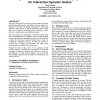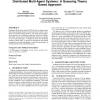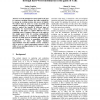163 search results - page 5 / 33 » Evolving autonomous agent control in the Xpilot environment |
ECAL
2005
Springer
14 years 1 months ago
2005
Springer
This paper is about the design of an artificial neural network to control an autonomous robot that is required to iteratively solve a discrimination task based on time-dependent s...
GECCO
2008
Springer
13 years 8 months ago
2008
Springer
The goal of this project is to develop an agent capable of learning and behaving autonomously and making decisions quickly in a dynamic environment. The agent’s environment is a...
ATAL
2005
Springer
14 years 29 days ago
2005
Springer
Distributed Multi-Agent Systems (DMAS) such as supply chains functioning in highly dynamic environments need to achieve maximum overall utility during operation. The utility from ...
ATAL
2004
Springer
14 years 27 days ago
2004
Springer
An ad hoc agent environment is a way for users to interact with an ambient intelligent environment. Agents are associated with every device, service or content. Utilizing agents, ...
CIG
2005
IEEE
14 years 1 months ago
2005
IEEE
Several attempts have been made in the past to construct encoding schemes that allow modularity to emerge in evolving systems, but success is limited. We believe that in order to c...



